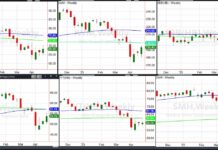 Investors have tagged the now publically-traded Twitter, Inc. (TWTR) with a near $40 Billion market capitalization as we enter year-end 2013. Yes, it’s been mentioned by some in the context of a bubble, and many have questioned that market cap in light of current losses and sketchy prospects for profit going forward. BUT, the fact remains that its popularity, usefulness, and importance for investors has only grown. And with this in mind, I thought it would be a good idea to highlight some Twitter tips for investors.
Investors have tagged the now publically-traded Twitter, Inc. (TWTR) with a near $40 Billion market capitalization as we enter year-end 2013. Yes, it’s been mentioned by some in the context of a bubble, and many have questioned that market cap in light of current losses and sketchy prospects for profit going forward. BUT, the fact remains that its popularity, usefulness, and importance for investors has only grown. And with this in mind, I thought it would be a good idea to highlight some Twitter tips for investors.
My personal Twitter relationship and recent perspective
I’ve been a regular Twitter user for some time (perhaps to me it just seems less creepy than Facebook (FB)). But after an extended period of use, I recently stepped away from the platform. This break has given me some insight on the social networking site and its usage, potential pitfalls, and opportunities for investors. The overwhelming quantity of information and a system which shortens our thoughts to 140 characters provides an incredible venue to disseminate or gather information. But, at the same time, its very nature can also lead to a shortening in investors’ time-frames and perspective.
Twitter Tips For Investors
This hiatus has resulted in some major takeaways and select Twitter tips for investors.
- First of all, Twitter’s ease of use and technology leads to an incredibly effective platform to distribute information in very detailed, analytical formats. Twitter’s structure seems to instinctively encourage investors, who are also active Twitter users, to lean more toward technical analysis, charts, moving averages, recent performance, etc. as their quantifiable, short, quick, and data driven nature provide a natural complement to each other.
- The second major takeaway involves fundamental analysis and the famine of it happening on Twitter. Perhaps this is a reflection of the current investing climate, but it appears the Twitter platform is not very conducive to matters of investment subjectivity (which fundamentals often are). Especially difficult for investors on Twitter may be the challenge in holding contrarian thoughts and going against the herd. By its very nature, this can be excruciatingly difficult and challenging for investors, but Twitter activity may take those challenges to a different level.
- Given these takeaways, it also appears that Twitter simply makes it much easier to buy stocks that are currently experiencing success and more difficult to buy those experiencing troubles. This is likely not a revelation for active users, but is critical for less-experienced investors to contemplate. Thinking of it as an equation where (NP) equals an investor’s normal psychology, if we add TWTR (Twitter), the equation (NP + TWTR) seems to = easier to buy stocks in an uptrend whereas it would also equal more difficult to buy beaten-down stocks. Flipping the equation on sell transactions (NP +TWTR) would = more difficult to sell in an uptrend whereas it would also equal easier to sell downtrodden stocks.
Explained very simplistically using Apple, Inc. (AAPL): Twitter seems to produce an environment where the move in Apple’s stock from $350 to $450 would’ve encouraged the propensity for investors to invest (versus not being on Twitter). However, if you were an active user of Twitter, the platform would’ve likely made it much more psychologically difficult to purchase those same shares of Apple when they traded at $10. Read some tweets from December 2012 about Best Buy’s (BBY) prospects if you doubt that last statement.
Whether an investor uses fundamental analysis, technical analysis, is a trend-follower, or is a deep-value bottom-fisher is of no relevance to these thoughts, and I am not debating how disciplined investors go about their craft. I’m not certain how many investing ideas are out there for discovery on Twitter, but as an investor, anything that influences investors’ actions and processes is definitely something to keep aware of, regardless its outcomes.
Perhaps the major all encompassing takeaway that I came away with is that Twitter is not unlike much of life where some of the largest values lie in the personal relationships, the contacts and interactions with those who’ve done it before you, those who reach out to you, and those who you can lend a helping hand to. Those are likely the best investments on Twitter. Thanks for reading.
Heart Capital does not offer investment advice via this medium. Under no circumstance whatsoever do these postings, opinions, charts, or any other information represent a recommendation or personalized investment, tax, or financial planning advice.
No position in any of the mentioned securities at the time of publication. Any opinions expressed herein are solely those of the author, and do not in any way represent the views or opinions of any other person or entity.








